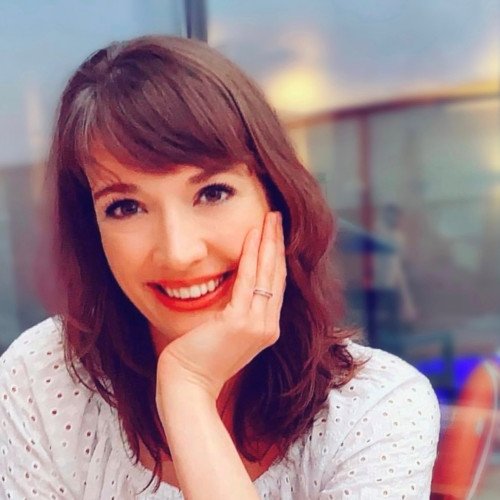
Dr. Éva Rita Czemmel
Dr. Éva Czemmel dedicates her life to curing “tiny feet”
For as long as I can remember, I have wanted to be a doctor, and within that, I wanted to work on curing children – says Dr. Éva Rita Czemmel, infant and pediatric physician, neonatologist.
Dr. Éva Rita Czemmel: She dedicates her life to healing “Little Feet”
For as long as I can remember, I have wanted to be a doctor, and within that, I wanted to work on healing children – says Dr. Éva Rita Czemmel, an infant and pediatric specialist, neonatologist, who has been a member of the TritonLife team since 2019. She helps premature babies with a huge heart and dedication, whom she considers true heroes.
Dr. Éva Rita Czemmel was born in Budapest, but she also has Polish ancestors. At first, they lived in Poland and went to school there, and after they moved back home, she studied Hungarian and Polish at the same time: in the mornings at the Petőfi Sándor High School, and in the afternoons at the high school operating under the Polish Embassy. To this day, she often travels to Poland, spending every summer there, as her oldest sister got married there.
Not only when I was a child, but also during my high school years, it was clear to me that I wanted to be a doctor. I graduated from Semmelweis University in 2009. The first two years of university were a tougher time because of the many theoretical classes, but then came the patient-centered, healing classes, and I really loved that part. I also liked radiology and ophthalmology, but since I had wanted to be a pediatrician since childhood, I eventually went in that direction,” recalled the doctor, who ended up in the PIC (Perinatal Intensive Care Center) department of Semmelweis during her internship.
Professional role models
As soon as I walked through the door, it was love at first sight. After the two years of residency, came the three years of medical residency. Fantastic role models helped me learn the basics of premature care, and then the professional mysteries, such as Dr. András Nobilis or Prof. Dr. Tamás Machay. In addition to theoretical knowledge and practical experience, what I am truly grateful for is their continuous love for the little ones. Building on solid foundations, I was able to work in a department led by Dr. István Kocsis, where in a few years, through teamwork, we established a 21st century perinatal intensive care center that meets modern expectations. We introduced international innovations in premature care very early in our practice, and we became at the forefront of the world's scientific research in the development of respiratory therapy care for low-birth-weight premature infants by using less and minimally invasive methods.
As a result, we managed to achieve complication-free survival in increasingly smaller and more affected premature infants. In 2017, we were able to save 495 babies out of 497 children treated in our department, which is a huge achievement, but what is even greater is that most of them can grow up without serious complications - emphasized Dr. Éva Rita Czemmel, who, in addition to her work as a clinical specialist, was also deputy head of department between 2017 and 2019.
Not just a baby, but a family is born
In addition to the successful practical application of classical medical results, it is also worth highlighting that they were among the first in Hungarian practice to implement family-centered care for premature infants. “By constantly extending the parental visitation time, we were able to put up a sign that parents are welcome to come at any time.” Mother-baby rooms were created, where mothers could actively participate in the care of their low-birth-weight or affected premature infants. “The presence of parents, kangaroo care, and other family-friendly practices, based on our current knowledge and our own practical experience, mean that premature infants recover faster and develop and grow better.”
In the meantime, the neurological outcome of prematurity also greatly piqued the doctor’s interest, so she began to further her education in the field of pediatric neurology. She broadened her knowledge in this field in several Hungarian pediatric neurology centers, and during this time, Dr. István Kocsis was already working at TritonLife Róbert Private Hospital. He approached her and encouraged her to join the team, with the challenge of creating a completely family-friendly, zero-separation-oriented new premature unit, which would include short-term and long-term follow-up of premature babies, as well as developmental neurology.
She is currently completing her pediatric neurology residency at Bethesda Children's Hospital, while working full-time at TritonLife, and is currently participating in a PhD program at Semmelweis University.
With the establishment of the family- and baby-friendly PIC II – where not just a baby, but a family is born – I feel that the little ones, or as we call them: the "Little Feet", are in the best hands, the neonatologist noted. Inspired by this name, he named the Facebook page he manages and edits “Aprótalp Falva” (Cracked Toe Village), where they try to bring together the affected families, as a kind of parent group, and where they share useful information with them.
She will still meet them years later
I draw strength from the fact that when I stand next to the incubators, I watch the little ones and see how, with our help and their own strength and great will to fight, they grow stronger day by day. In addition, it touches my soul deeply when, on November 17, World Premature Birth Day, the little ones come back as older children, and most of them don’t even notice that they were born prematurely. Parents also send photos of their growth and starting school, it’s all a fantastic experience – shared Dr. Éva Rita Czemmel, who believes that premature babies go through a struggle that adults would not be able to endure.
 Log in with GoodID
Log in with GoodID